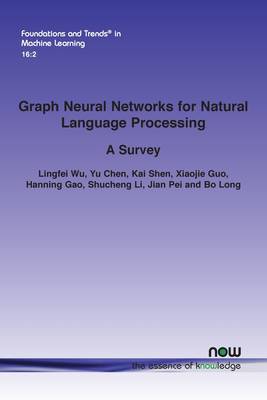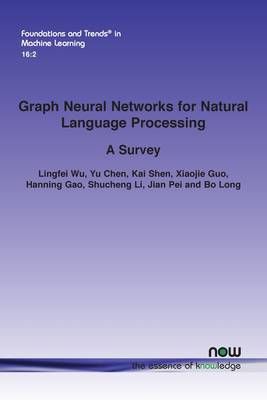
- Afhalen na 1 uur in een winkel met voorraad
- Gratis thuislevering in België vanaf € 30
- Ruim aanbod met 7 miljoen producten
- Afhalen na 1 uur in een winkel met voorraad
- Gratis thuislevering in België vanaf € 30
- Ruim aanbod met 7 miljoen producten
Zoeken
Graph Neural Networks for Natural Language Processing
A Survey
Lingfei Wu, Yu Chen, Kai Shen, Xiaojie Guo, Hanning Gao, Shucheng Li, Jian Pei, Bo Long
€ 134,45
+ 268 punten
Omschrijving
Deep learning has become the dominant approach in addressing various tasks in Natural Language Processing (NLP). Although text inputs are typically represented as a sequence of tokens, there is a rich variety of NLP problems that can be best expressed with a graph structure. As a result, there is a surge of interest in developing new deep learning techniques on graphs for a large number of NLP tasks. In this monograph, the authors present a comprehensive overview on Graph Neural Networks (GNNs) for Natural Language Processing. They propose a new taxonomy of GNNs for NLP, which systematically organizes existing research of GNNs for NLP along three axes: graph construction, graph representation learning, and graph based encoder-decoder models. They further introduce a large number of NLP applications that exploits the power of GNNs and summarize the corresponding benchmark datasets, evaluation metrics, and open-source codes. Finally, they discuss various outstanding challenges for making the full use of GNNs for NLP as well as future research directions. This is the first comprehensive overview of Graph Neural Networks for Natural Language Processing. It provides students and researchers with a concise and accessible resource to quickly get up to speed with an important area of machine learning research.
Specificaties
Betrokkenen
- Auteur(s):
- Uitgeverij:
Inhoud
- Aantal bladzijden:
- 224
- Taal:
- Engels
- Reeks:
Eigenschappen
- Productcode (EAN):
- 9781638281429
- Verschijningsdatum:
- 25/01/2023
- Uitvoering:
- Paperback
- Formaat:
- Trade paperback (VS)
- Afmetingen:
- 156 mm x 234 mm
- Gewicht:
- 322 g

Alleen bij Standaard Boekhandel
+ 268 punten op je klantenkaart van Standaard Boekhandel
Beoordelingen
We publiceren alleen reviews die voldoen aan de voorwaarden voor reviews. Bekijk onze voorwaarden voor reviews.











